Transfer News
January – March 2022
UFZ expert talk – Jan Bumberger explains UFZ's focus on digitisation in environmental sciences
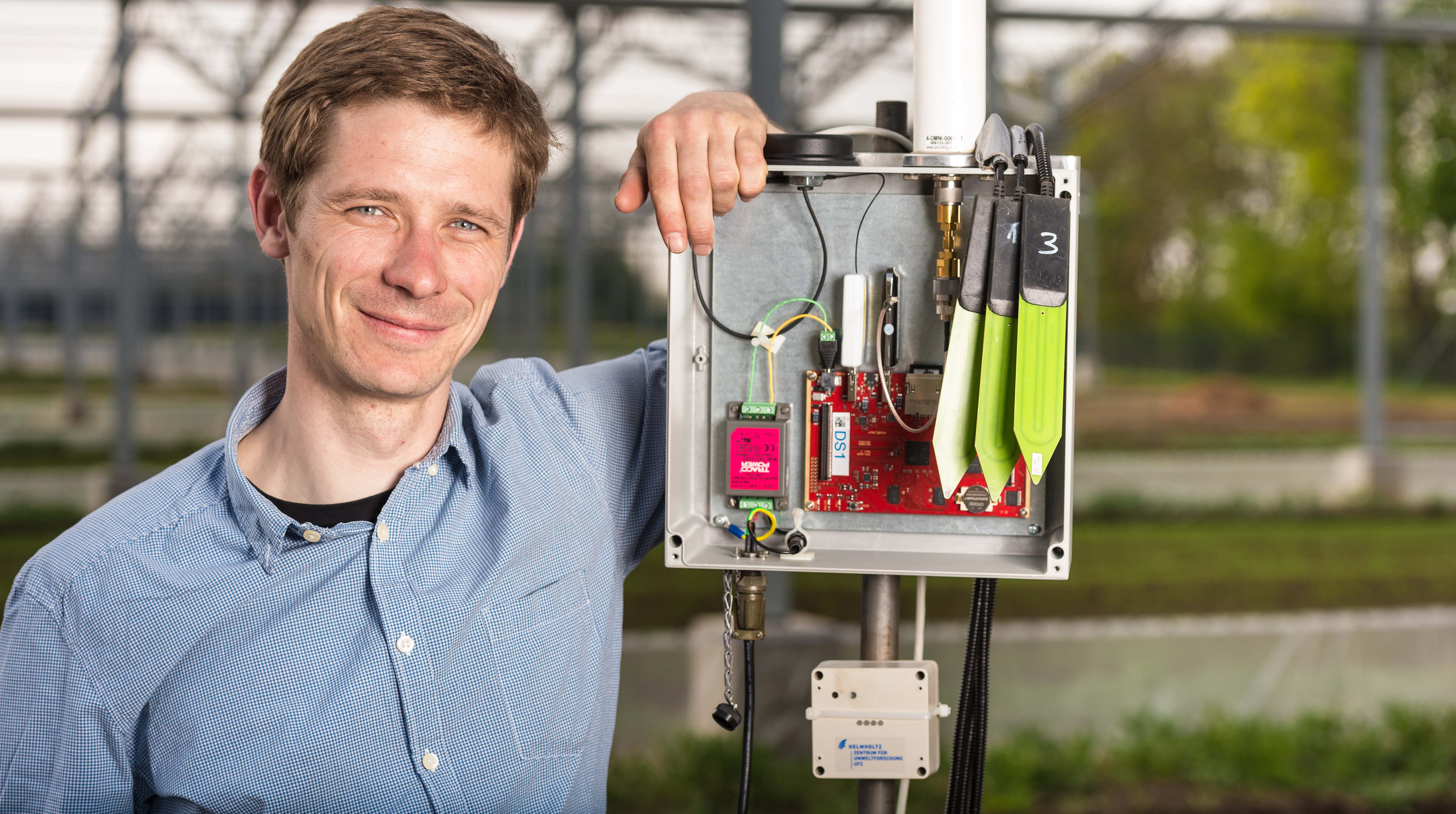 GTAI GmbH spoke to UFZ scientist Dr.-Ing. Jan Bumberger about the current state of digitisation in environmental sciences, the key challenges and opportunities for innovative solutions and new actors. He also explained the research projects on the topic that were and are still being carried out under the leadership of the UFZ.
GTAI GmbH spoke to UFZ scientist Dr.-Ing. Jan Bumberger about the current state of digitisation in environmental sciences, the key challenges and opportunities for innovative solutions and new actors. He also explained the research projects on the topic that were and are still being carried out under the leadership of the UFZ.
The entire interview with the answers to the above-mentioned topics can be found here.
GTAI - Germany Trade & Invest GmbH - is the economic development agency of the German Government and shareholder of the Federal Ministry for Economic Affairs and Energy. Among other things, GTAI supports the settlement of international companies in Germany with the aim of maintaining and expanding value chains in Germany and creating jobs. In addition, it markets Germany as a business location and supports German companies in exporting.
Dr.-Ing. Jan Bumberger has been coordinating research data management at the UFZ since 2019 and is responsible for a large number of projects on digitisation in research. He is also co-coordinator of the DataHub and coordinator of HubTerra in the Research Field Earth and Environment of the Helmholtz Research Association. In 2011, he successfully completed his PhD in Theoretical Electrical Engineering and Information Technology. Since then, he has headed the Environmental Sensor and Information Systems working group at the UFZ.
March 2022
Protection against indoor radon – results available from ventilation experiments within a ZIM project of the UFZ
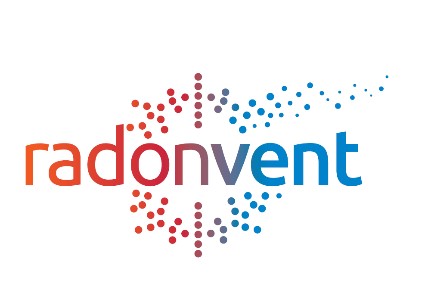 As part of the ZIM-funded project (ZIM: Central Innovation Programme for SMEs) "radonvent", scientists from the UFZ Department of Environmental Informatics are working with partners on a system that wirelessly integrates the radon activity concentration as a control parameter in decentralised ventilation systems with heat recovery and zone control and uses this to automatically control the ventilation. The UFZ's partners in the project are SARAD GmbH in Dresden, inVENTer GmbH in Löberschütz, Bergsicherung Schneeberg GmbH & Co. KG, Gebäude- und Wohnungsverwaltung GmbH Schlema, Staatliche Betriebsgesellschaft für Umwelt und Landwirtschaft in Chemnitz and the Saxon Radiation Protection Authority LfULG in Dresden.
As part of the ZIM-funded project (ZIM: Central Innovation Programme for SMEs) "radonvent", scientists from the UFZ Department of Environmental Informatics are working with partners on a system that wirelessly integrates the radon activity concentration as a control parameter in decentralised ventilation systems with heat recovery and zone control and uses this to automatically control the ventilation. The UFZ's partners in the project are SARAD GmbH in Dresden, inVENTer GmbH in Löberschütz, Bergsicherung Schneeberg GmbH & Co. KG, Gebäude- und Wohnungsverwaltung GmbH Schlema, Staatliche Betriebsgesellschaft für Umwelt und Landwirtschaft in Chemnitz and the Saxon Radiation Protection Authority LfULG in Dresden.
Over the period of one year, 22 measurements were carried out in ventilation experiments. The evaluation of the data has now been successfully published.
The following results could be determined:
1) Ventilation experiments with forced overpressure were particularly successful and achieved a significant radon reduction (up to 80%) in both summer and winter.
2) Influence of seasonal variations showed that in summer it is quite possible to work with a lower output level of the ventilation units.
3) Living rooms can have different initial radon activity concentrations, accordingly not all rooms require the same ventilation output of the ventilation units. No simple generalisation is possible and individual preliminary investigations are necessary.
4) Annual and diurnal variations in outdoor temperature and wind speed showed that the effects of meteorological parameters on indoor and outdoor radon activity concentrations are quite complex, but have no particular influence on successful indoor radon reduction by ventilation.
In general, it was found that the radon activity concentration in all rooms of the dwelling was significantly higher in winter than in summer, but even with high radon levels, the decentralised ventilation system was able to reduce radon in the rooms.
Literature:
1) Publication: Decentralised ventilation efficiency for indoor radon reductions considering different environmental parameters. Isotopes in Environmental and Health Studies (Volume 58, 2022 – Issue 2)
2) Federal Office for Radiation Protection (BfS) (2019): Radon-Handbuch Deutschland 2019. Available in German online here
3) Schubert, M., Musolff, A., & Weiss, H. (2018): Influences of meteorological parameters on indoor radon concentrations (222Rn) excluding the effects of forced ventilation and radon exhalation from soil and building materials. Journal of Environmental Radioactivity, 192, 81-85. doi: 10.1016/j.jenvrad.2018.06.011
4) Dehnert et al. (2019): Radonschutz in Wohnungen durch radonaktivitätskonzentrationsgesteuerte Lüfter. Jahrestagung 2019, Strahlenschutz und Medizin, Patienten - Beschäftigte – Gesellschaft. Würzburg, 9.-12. September 2019. Fachverband für Strahlenschutz e.V.; Available in German online here.
More information and contact: Prof. Dr. Holger Weiß, Department of Environmental Informatics ( holger.weiss@ufz.de )
March 2022
transfun – finding solutions together
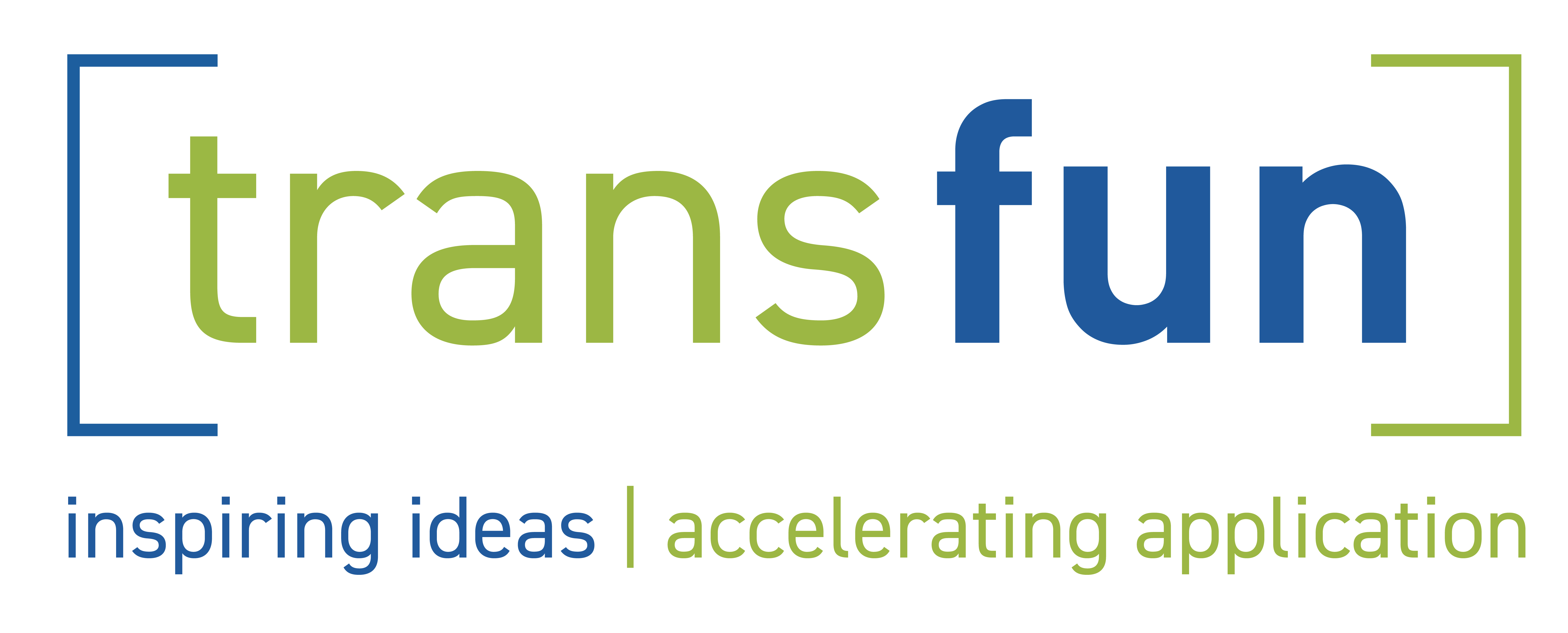 As part of a call for proposals from the Helmholtz Association, the Knowledge and Technology Transfer (WTT) at the UFZ has been granted additional funding for technology transfer.
As part of a call for proposals from the Helmholtz Association, the Knowledge and Technology Transfer (WTT) at the UFZ has been granted additional funding for technology transfer.
The new UFZ funding programme transfun has been supporting cooperation with national and international companies since February 2022 and continues to create new opportunities to quickly and easily tackle problems, find solutions and develop joint products.
Another focus of the programme with its four funding modules - transtest, transproof, transmarket, transbig - is the involvement of mentors from the business world who contribute their market or customer experience in order to incorporate market relevance and customer perspectives into the UFZ's transfer projects.
Benefit from our many years of experience, broad expertise and innovations, especially in the fields of sustainable biotechnology, groundwater and wastewater remediation or environmental technology such as sensor technology, information systems and monitoring products. Take the chance and start a new project together with the UFZ! If you would like to learn more about transfun simply contact us via wtt@ufz.de .
February 2022
UFZ supports the project "Leipziger BlauGrün – Blue-Green Neighbourhood Development in Leipzig"
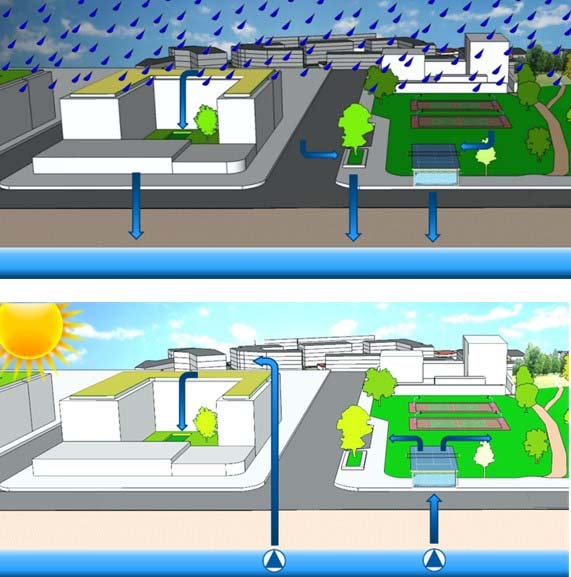 In order to adapt cities like Leipzig to climate change, the RES:Z1) project "Leipziger BlauGrün", coordinated by the UFZ, is co-developing resource-efficient urban neighbourhoods and providing planning support.
In order to adapt cities like Leipzig to climate change, the RES:Z1) project "Leipziger BlauGrün", coordinated by the UFZ, is co-developing resource-efficient urban neighbourhoods and providing planning support.
On a 26ha brownfield site, the new "Leipzig416" neighbourhood which will be established in the inner city area will include 2200 residential units, 2 schools and several kindergartens. Within this process, new transferable blue-green technologies and planning tools will be developed. They will show in an exemplary way how a relief of the central sewage system, an improvement of energy efficiency, a resilient heavy rainfall management and the establishment of new communication structures for shaping the urban development process can be realised in the future.
The project, which runs from 01.10.2019 to 31.12.2022, has the funding code 033W110A-K.
The partners in the project are the City of Leipzig, Kommunale Wasserwerke Leipzig, Stadtwerke Leipzig, HTWK Leipzig, Leipzig University, the Federal Environment Agency, Fraunhofer-IGB, DHI WASY GmbH, Tilia GmbH, Optigrün International AG and Leipzig 416 GmbH.
A cross-project working group produced a handout, which can be downloaded here for free.
Find more information on the project „Leipziger BlauGrün“
1) BMBF funding measure "Resource Efficient Urban Neighbourhoods for the Future - RES:Z” – RES:Z“February 2022
UFZ Awards 2021 presented for Technology Transfer, Knowledge Transfer and Young Scientists Award for Applied Research
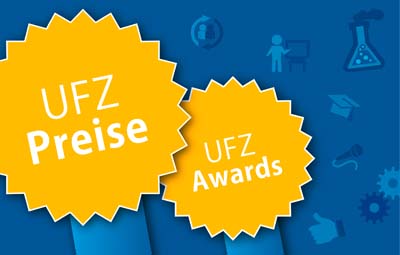 Awards are given for innovative technologies, processes and products that demonstrate scientific quality, innovative achievements, (future) success, applicability and application, while also contributing to the transfer performance to overcoming major challenges in the environment and society.
Awards are given for innovative technologies, processes and products that demonstrate scientific quality, innovative achievements, (future) success, applicability and application, while also contributing to the transfer performance to overcoming major challenges in the environment and society.
The UFZ Awards 2021 were given to the following scientists on 02 December 2021.
The RWInnoTec team (Department of Technical Environmental Chemistry) received the UFZ Technology Transfer Award for developing a wide range of applications for radio wave technology. Based on this, the team founded the company RWInnoTec.
Dr. Karsten Rinke (Department of Lake Research) received the UFZ Science Transfer Award for his excellent transfer activities of research results into water management practice. Karsten Rinke has developed the UFZ Lake Research Department into a respected consulting and expert hub among reservoir operators and has made an important transfer of research results into water management practice in the form of scientifically based approaches. Concrete examples are management strategies such as the thermo pipet at the Große Dhünn Reservoir, the conception of new water abstraction structures for blue-green algae control at the Bautzen Reservoir and the reservoir observatory with the Saxony-Anhalt Reservoir operation. The criteria for decision-making include scientific quality, solution orientation, applicability and, in particular, the application of the transferred knowledge, as well as the contribution of the transfer performance to overcoming major challenges in the environment and society.
The UFZ Young Scientists Award for Applied Research, which was presented for the first time in 2021, was given to Dr. María Felipe-Lucia (Department of Ecosystem Services) and Dr. David Leuthold (Department of Bioanalytical Ecotoxicology) for their excellent inter- and transdisciplinary work on highly relevant topics to society with outstanding output.
Dr. Maria Felipe-Lucia received the award for her work on the socio-ecological transformation of agro-ecosystems and Dr. David Leuthold for the development of a zebrafish embryo-based test system to detect neurodegenerative diseases.
January 2022
Turf Coach UG – new spin-off at the UFZ offers solutions for smart and sustainable turf management.
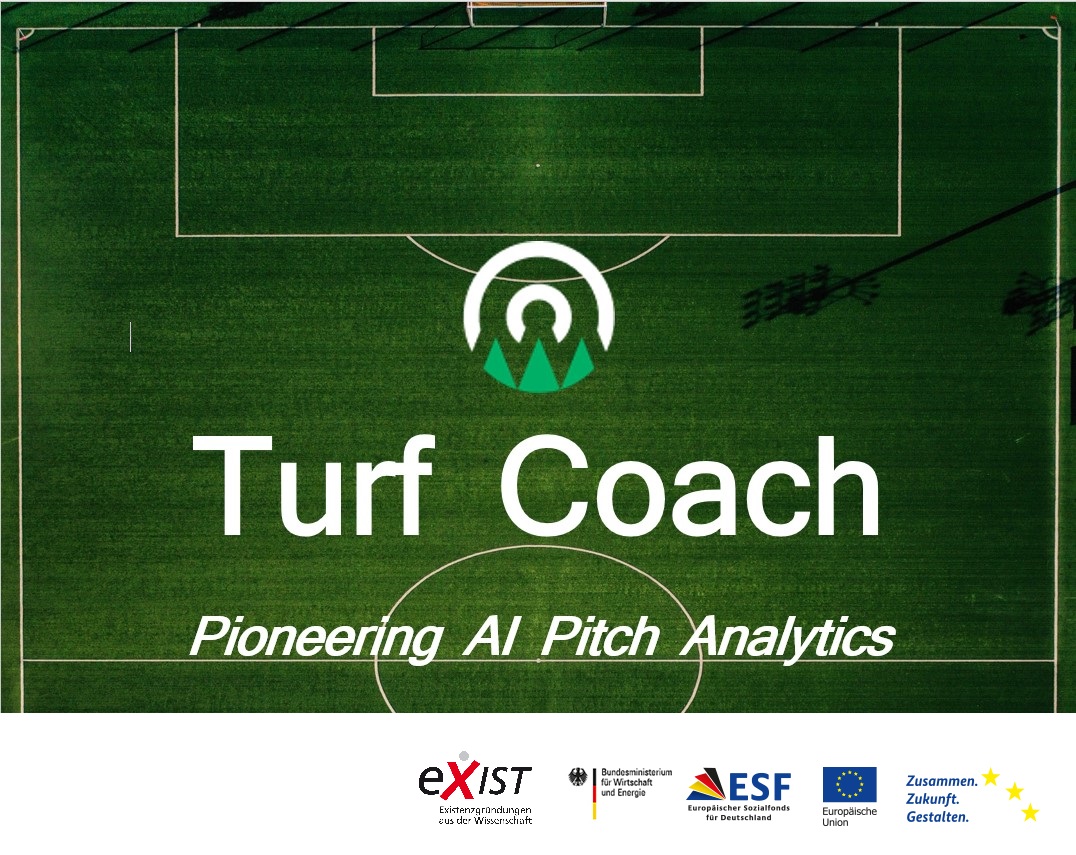 Turf Coach UG – this EXIST-funded start-up team under the leadership of Christian Theil – together with Prof. Dr. Peter Dietrich, head of the UFZ Department of Monitoring and Exploration Technologies, have developed a sensor-based solution for smart turf management (greenkeeping) at sports clubs. The target market is worth millions. This is because turf maintenance is labour-intensive and because poor pitch conditions increase the risk of injury to players considerably.
Turf Coach UG – this EXIST-funded start-up team under the leadership of Christian Theil – together with Prof. Dr. Peter Dietrich, head of the UFZ Department of Monitoring and Exploration Technologies, have developed a sensor-based solution for smart turf management (greenkeeping) at sports clubs. The target market is worth millions. This is because turf maintenance is labour-intensive and because poor pitch conditions increase the risk of injury to players considerably.
The days of greenkeepers, who associated "lawn care" primarily with "mowing the lawn" are over. Today's sports fields have to meet a wide range of requirements. These include, for example, an increase in the number of games with an increasing risk of injury to players. On the one hand, climate change is resulting in drier soils, new kinds of pests and more extreme weather events. On the other hand, room for change is increasingly limited by stricter ecological regulations on the use of pesticides and a ban on artificial turf because of the microplastics produced by abrasion.
These new challenges can only be met with innovative technologies, which call for collecting highly qualitative data on the turf. Christian Theil's international team, with expertise in precision agriculture, machine learning and motion and plant research, has developed the Green Scanner to meet this purpose. The scanner combines electromagnetic, optical and mechanical sensors to collect high-resolution data on turf conditions over a large area. The data obtained is then analysed by machine-learning algorithms in order to be able to provide fast and precise recommendations for action via the company's own software.
The offered safe, cost-efficient, ecological and technology-based solution for the maintenance of natural grass is therefore of great importance. Currently, a number of tests are being carried out on the training fields of a pilot customer in Leipzig, while other national and international clubs are following the promising results with great interest!
For more information, write to info@turfcoach.de .
January 2022
